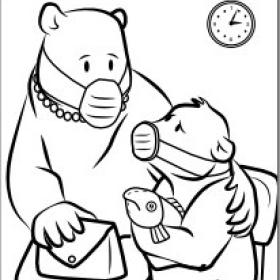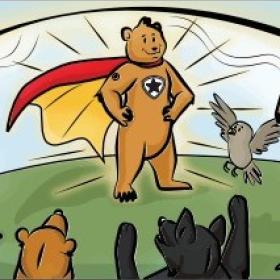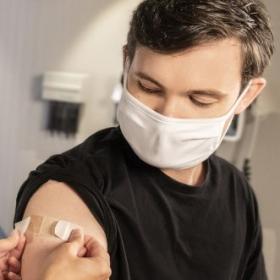Date last reviewed:
Tuesday, Apr 09, 2024
ABOUT THE VACCINE
Information
Getting a vaccine
Everyone 6 months of age and older can get the COVID-19 vaccine. Immunization is one of the most effective ways to protect against severe illness from COVID-19.
Your COVID-19 vaccine
A spring COVID-19 vaccine is recommended for people who are at higher risk of getting seriously sick from COVID-19. The vaccine remains free and available for everyone 6 months and older.
- Getting a spring 2024 vaccine
-
COVID-19 vaccines are free and available for everyone 6 months and older in B.C. The spring vaccines are the same vaccines that were available in fall 2023 and target the XBB.1.5 variant.Getting a spring vaccine is recommended for those at increased risk of COVID-19 infection or severe disease, including:
- People 65 years of age and older.
- Indigenous peoples (First Nations, Métis, and Inuit) age 55 years of age and older.
- Residents of long-term care and assisted living (including those waiting for placements).
- People with underlying medical conditions that place them at higher risk of severe COVID-19. This includes people who are diagnosed as clinically extremely vulnerable (CEV 1 or CEV 2 conditions).
A spring vaccine is also recommended for anyone 6 months of age and older who has not yet received a COVID-19 vaccine that protects against the XBB.1.5 variant.If a spring vaccine is recommended and you are registered with the provincial system, you will receive an invitation to book an appointment.Anyone else who feels they would benefit from a spring vaccine can contact the call centre to book a vaccine at 1-833-838-2323. You may also be able to walk into a pharmacy where the vaccine is available.Get the spring 2024 vaccine before the end of June so that you will be eligible to get another vaccine before the next respiratory season. It is often recommended you wait 6 months between COVID-19 vaccine doses for best results.B.C.’s vaccination campaign is based on the latest recommendations from the National Advisory Committee on Immunization (NACI). - How to get the vaccine
-
To get your invitation to book an immunization appointment, make sure you or your child are registered with the Get Vaccinated system. Once registered, you will receive an invitation to book an appointment.Register
- Online: gov.bc.ca/getvaccinated, available in 12 different languages
- By phone: Call 1-833-838-2323 (toll-free), available in 140 different languages.
- In-person: At all Service BC offices. You will need to have a Personal Health Number. Find a Service BC office.
If you don't have a Personal Health Number, you need to register by phone by calling 1-833-838-2323. A Personal Health Number will be created for you.Book an appointment
You will receive an invitation by email or text message to book a vaccine appointment.You can select a date and time at a community pharmacy or vaccination clinic near you. If needed, you can easily reschedule your appointment online.You can call 1-833-838-2323 if you have questions.If you need another COVID-19 vaccine in the future, you will receive another invitation to book an appointment when you are eligible.People living in First Nations communities can contact their community health centre or nursing station to find out how to book a COVID-19 vaccine appointment. - Which vaccine will I receive?
-
The COVID-19 vaccines available are:
- Moderna Spikevax mRNA vaccine
- Pfizer-BioNTech Comirnaty mRNA vaccine
- Novavax protein-based vaccine
The vaccines have been updated to target the XBB.1.5 variants.If you're 12 or older and prefer a non-mRNA vaccine, select the non-mRNA vaccine option when you book your appointment online or phone the call centre. - How many doses?
-
No matter how many previous doses you’ve received, everyone 6 months and older should get at least one dose of the XBB.1.5 COVID-19 vaccine.Some may need additional doses depending on their age, medical conditions and vaccination history, such as:
- Children aged 6 months to 4 years who have never had a COVID-19 vaccine.
- People who are moderately to severely immunocompromised who don't develop a strong enough immune response.
Call 1-833-838-2323 if you are eligible and have not yet received an invitation to book an additional dose.There are printable handouts available for download about COVID-19 vaccination available for people who are considered clinically extremely vulnerable. - Timing and previous doses
-
The National Advisory Committee on Immunization (NACI) recommends getting the updated COVID-19 mRNA vaccine at least 6 months after your last dose of COVID-19 vaccine.This interval may be shorter depending on your age, medical conditions and COVID-19 vaccination history.There are no safety concerns with getting a different vaccine brand from your previous doses.
- Timing of vaccination after infection
-
If you've recently had a positive COVID-19 test result, the chance of getting COVID-19 again is low in the months after infection. You can wait up to 3 to 6 months for your next vaccine dose. The immune response is better when there is more time between infection and vaccination.How to know if you’ve had COVID-19
- If you have ever had a positive COVID-19 test (PCR or rapid antigen test at home)
- If you ever had symptoms of COVID-19 and someone else in your household tested positive around the same time.
Benefits of COVID-19 vaccination
There are many benefits of getting vaccinated against COVID-19:
- The vaccines protect against severe COVID-19 illness, including hospitalization and death.
- Vaccination is a safer, more reliable way to build protection than getting sick with COVID-19.
- COVID-19 vaccines can offer added protection to people who have had COVID-19.
- When you or your child get vaccinated, you help protect others, including those who cannot get the vaccine.
- Vaccination can reduce the risk of post COVID-19 condition. Post COVID-19 condition, also known as long COVID, is when people still experience symptoms of COVID-19 for weeks or months after their initial recovery.
COVID-19 vaccine safety and monitoring
COVID-19 vaccines are safe. It is much safer to get the vaccine than to get COVID-19.
There is a very strict process to test and approve vaccines in Canada. Health Canada only approves a vaccine if it is safe, effective, meets manufacturing standards, and the benefits outweigh the risks. After a vaccine is approved for use, its safety is continuously monitored.
Evidence from billions of COVID-19 vaccines given around the world continues to show that COVID-19 vaccines are safe and that the benefits of COVID-19 vaccines continue to outweigh the risks of the disease.
Information
Learn more about COVID-19 vaccine safety:
Side effects
Side effects after getting a COVID-19 vaccine can vary from person to person. Some people experience side effects, and others don’t. Even if a person doesn't experience any side effects, their body is building protection against the virus that causes COVID-19.
Side effects of COVID-19 vaccines are most often mild and generally last 1 to 2 days. Serious side effects are rare. The known risks of COVID-19 illness outweigh the potential risk of having a serious side effect following vaccination.
- Common vaccine side effects
-
Side effects are common a day or two after getting the COVID-19 vaccine. These can include:
- Pain, redness, itchiness or swelling in the arm where the vaccine was given (right away and/or 7 days after).
- Swollen lymph nodes under the armpit.
- Tiredness or headache.
- Fever and chills.
- Muscle or joint soreness.
- Nausea and vomiting.
Children experience similar side effects as adults, though they may experience some of them, like headache, chills, and fever, more often.Most side effects are not serious and should go away on their own. Some side effects are a sign that the vaccine is working and your immune system is building a response.Tips for side effects- Apply a cool, damp cloth or wrapped ice pack to painful areas.
- Medications like acetaminophen (Tylenol) or ibuprofen (Advil) can be used to ease discomfort. ASA (e.g. Aspirin) should not be given to anyone under 18 years of age. Ibuprofen should not be given to a baby under 6 months of age unless a doctor tells you to give it. If you are pregnant, do not take ibuprofen; treat discomfort or fever with Tylenol instead.
Some of the side effects of the vaccine are similar to symptoms of COVID-19. The vaccine will not cause or give people COVID-19.Symptoms such as sore throat, runny nose, cough, or problems breathing are NOT side effects of the vaccine. If you or your child experience any symptoms of COVID-19, use the BC COVID-19 Self-Assessment Tool.If you are worried about any symptoms, contact your health care provider or call 8-1-1.
- Serious side effects and adverse events
-
Serious side effects after getting the vaccine are rare. Seek medical attention or call 9-1-1 right away if you or your child develop any serious side effects or a severe allergic reaction, including:
- Hives.
- Swelling of the face, tongue or throat.
- Difficulty breathing.
- Chest pain.
- Shortness of breath.
- Feeling of a rapid or abnormal heart rhythm.
When you see a healthcare provider, let them know that you or your child received the COVID-19 vaccine recently so they can report the issue to local public health if they suspect the symptoms were related to the vaccine.
- Rare events after getting a vaccine
-
Serious symptoms are extremely rare after the vaccine. Rare cases of heart inflammation have been reported. Watch for these symptom for 7 days after vaccination:
- Chest pain
- Shortness of breath
- Feeling of a fast-beating, fluttering, or pounding heart that does not go away with rest or is accompanied by other symptoms.
If you or your child experience any of these symptoms
- Seek medical attention right away
- Tell your healthcare provider you or your child recently got a COVID-19 vaccine
- How to report adverse events
-
Please report any adverse events following vaccination to your immunizer, health care provider, or doctor. Health care providers are trained to report these events to the correct channels to monitor vaccine safety.If you have questions about side effects or a possible reaction to the vaccine, contact HealthLink BC by calling 8-1-1.
- Vaccination aftercare
-
- Infants and young children.
- School-age children and teens.
- Adults.
COVID-19 immunization records
When you get vaccinated, your information will be entered into the Provincial Immunization Registry and will be accessible to you, public health, and your doctor.
Access your immunization record:
- Online: Register for Health Gateway. You need a mobile BC services card to register.
- Phone: Call 1-833-838-2323 to request a mailed copy of your immunization record.
In person at a Service BC office: You can get a printed copy of your immunization record at all Service BC offices.
ABOUT THE DISEASE
What is COVID-19?
- COVID-19 is an infection of the airways and lungs caused by the SARS-CoV-2 coronavirus.
- The virus that causes COVID-19 is spread from person to person by coughing, sneezing, talking and singing. It can also be spread by touching an object or surface with the virus on it and then touching your eyes, nose or mouth.
- Symptoms of COVID-19 can include cough, shortness of breath, fever, chills, tiredness, and loss of smell or taste.
- While some people with COVID-19 may have no symptoms or only mild symptoms, others can require hospitalization and may die.
- Serious illness is more common in those who are older and those with certain chronic health conditions such as diabetes, heart disease, or lung disease.
-
While most children who get COVID-19 have a minor illness, some:
-
Require hospitalization for complications, such as difficulty breathing.
-
Get a severe lung infection and heart issues like myocarditis (inflammation of the heart muscle).
-
Get a rare but serious complication called multisystem inflammatory syndrome in children (MIS-C). MIS-C is caused by an exaggerated immune response, leading to severe widespread inflammation. It can happen several weeks after infection and usually requires hospitalization. Most children in Canada who have had this condition have fully recovered with treatment.
-
- Children with underlying medical conditions are more likely to get severely ill from COVID-19. However, healthy children without underlying medical conditions can also experience severe illness.
- For some people, symptoms of COVID-19 can last for weeks or longer. This is called post-COVID condition or "long COVID.”
- The long-term effects of COVID-19 on a person’s health are unknown.
COLOURING PAGES
Jesse is going to get a COVID-19 vaccine and is a little nervous. Jesse brought a favourite toy and used belly breathing to feel calm. There was a tiny pinch on the arm, and it was over. That was easy! Jesse is now a COVID-19 vaccine superhero!






